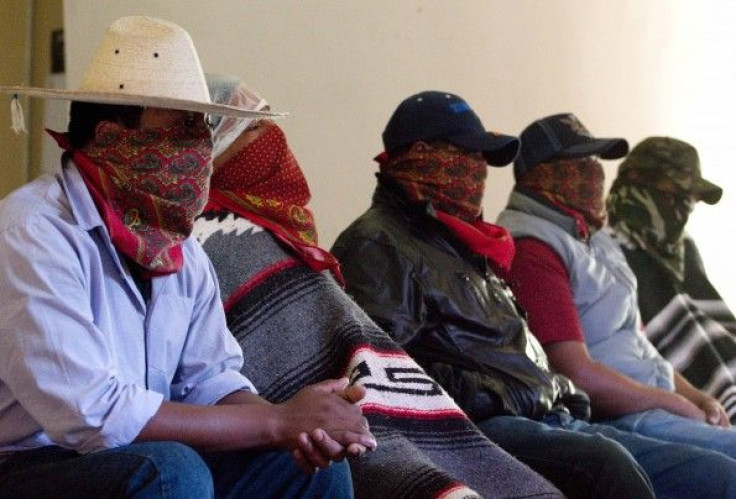
The governor of the Mexican state of Michoacán, Jesús Reyna, says that the civilian self-defense militias which had arisen in several towns around the state in order to defend their communities against the drug cartels which exerted de facto control over the region have been disarmed. Mexican President Enrique Peña Nieto had sent troops to the state to squash the militias. Reyna told MVS Radio that the groups were operating "outside of the law" because they were using weapons reserved for military use, and because they were an impediment to the town's police. An interview with one militia member from the town of Tepalcatepec back in June might shed light on what the groups ever arose in the first place.
During the interview, the militia member -- an unnamed country doctor who serves on the militia's board, which coordinates the civilian tribunals that dispense justice to captured cartel members -- describes how the armed self-defense groups first came about.
The Knights Templar cartel had for quite some time gone about its business with impunity in the town, he says. They'd existed a sort of pact with the townspeople: you don't mess with our business, and we won't mess with you.
RELATED: Mexico Drug War 2013: Vigilante Militia Act As Police, Say They Provide Security; Government Tries To Crack Down
"Honestly, we would see them going around well-armed in the streets, with a bunch of trucks, a lot of people with weapons, but it was as if they were ghosts," he says. Those gang members would prey exclusively upon members of another cartel in the region, La Familia. But in the past three years, as the Knights Templar took definitive hold of the area, they turned their sights on the townspeople, charging them taxes and kidnapping them if they didn't pay it. They would even extort money, he says, from little girls on their way to school. And sometimes, they went further than that: in the month of December, the doctor claims, 14 girls between the ages of 11 and 13 were raped.
RELATED: Venezuela President Nicolas Maduro To Arm New 'Workers Militia'; Does Maduro Distrust The Military?
They also targeted business owners -- ranchers, butchers, tortilla makers - but they didn't complain; they simply passed on that tax to whoever bought from them. The tipping point came when the Knights Templar started to demand more than just money.
RELATED: Rafael Caro Quintero, Drug Kingpin, To Go Free On Technicality After 28 Years In Jail
"It was when they started to come to your house," he says, jabbing a finger, "and they would tell you, 'I really like your woman, I'll come get her from you in a bit, but meanwhile give your daughter a bath, because she's going to stay with me for a few days'. And they wouldn't return her to you until she was pregnant. That was the problem that triggered the situation in Tehuantepec. Because they did it to the wealthiest cattle ranchers in Tepalcatepec just like they did it to the poorest people on the ranches."
Following the disarming of the militias throughout the state, Octavio Villanueva, representative of a militia from an indigenous community, protested bitterly against the federal military's incursion into the region, accusing them of using excessive force against militia members and leaving the community "at the margin of organized crime".
"We've had no response from the government to come and help us," he said.
The doctor in the June video echoes that claim and in fact, goes one step further, accusing authorities of complicity with the drug cartel leaders. "No authority could carry out their duties because all the authorities, from the municipal to the state to the federal ones, were part of the cartels, or they were on the payroll of the cartels...federal personnel, military personnel, would come in and would never find [the cartels], but we would see them when they would sit down to eat breakfast with them. When the very leaders of the cartel."
© 2024 Latin Times. All rights reserved. Do not reproduce without permission.